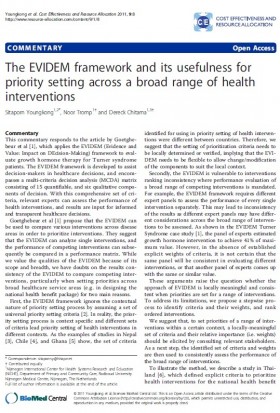This website uses cookies so that we can provide you with the best user experience possible. Cookie information is stored in your browser and performs functions such as recognising you when you return to our website and helping our team to understand which sections of the website you find most interesting and useful.
The EVIDEM framework and its usefulness for priority setting across a broad range of health interventions.(2011)

รายละเอียดเพิ่มเติม
The EVIDEM framework and its usefulness for priority setting
across a broad range of health interventions
- * Corresponding author: Sitaporn Youngkong [email protected]
- † Equal contributors
1 Nijmegen International Center for Health Systems Research and Education (NICHE), Department of Primary and Community Care,
Radboud University Nijmegen Medical Centre, Nijmegen, The Netherlands
2 Health Intervention and Technology Assessment Program (HITAP), Ministry of Public Health, Nonthaburi, Thailand
3 School of Public Health and Social Sciences-Muhimbili, University of Health and Social Sciences, Tanzania
his commentary responds to the article by Goetghebeur et al , which applies the EVIDEM (Evidence and Value: Impact on DEcision-Making) framework to evaluate growth hormone therapy for Turner syndrome patients. The EVIDEM framework is developed to assist decision-makers in healthcare decisions, and encompasses a multi-criteria decision analysis (MCDA) matrix consisting of 15 quantifiable, and six qualitative components of decision. With this comprehensive set of criteria, relevant experts can assess the performance of health interventions, and results are input for informed and transparent healthcare decisions.
Goetghebeur et al propose that the EVIDEM can be used to compare various interventions across disease areas in order to prioritize interventions. They suggest that the EVIDEM can analyze single interventions, and the performance of competing interventions can subsequently be compared in a performance matrix. While we value the qualities of the EVIDEM because of its scope and breadth, we have doubts on the results consistency of the EVIDEM to compare competing interventions, particularly when setting priorities across broad healthcare service areas (e.g. in designing the national health benefit package) for two main reasons.




